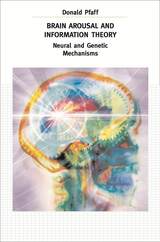
Arousal is fundamental to all cognition. It is intuitively obvious, absolutely necessary, but what exactly is it? In Brain Arousal and Information Theory, Donald Pfaff presents a daring perspective on this long-standing puzzle. Pfaff argues that, beneath our mental functions and emotional dispositions, a primitive neuronal system governs arousal. Employing the simple but powerful framework of information theory, Pfaff revolutionizes our understanding of arousal systems in the brain.
Starting with a review of the neuroanatomical, neurophysiological, and neurochemical components of arousal, Pfaff asks us to look at the gene networks and neural pathways underlying the brain’s arousal systems much as a design engineer would contemplate information systems. This allows Pfaff to postulate that there is a bilaterally symmetric, bipolar system universal among mammals that readies the animal or the human being to respond to stimuli, initiate voluntary locomotion, and react to emotional challenges. Applying his hypothesis to heightened states of arousal—sex and fear—Pfaff shows us how his theory opens new scientific approaches to understanding the structure of brain arousal.
A major synthesis of disparate data by a preeminent neuroscientist, Brain Arousal and Information Theory challenges current thinking about cognition and behavior. Whether you subscribe to Pfaff’s theory or not, this book will stimulate debate about the nature of arousal itself.
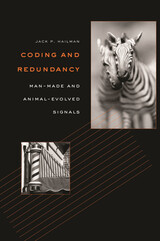
This book explores the strikingly similar ways in which information is encoded in nonverbal man-made signals (e.g., traffic lights and tornado sirens) and animal-evolved signals (e.g., color patterns and vocalizations). The book also considers some coding principles for reducing certain unwanted redundancies and explains how desirable redundancies enhance communication reliability.
Jack Hailman believes this work pioneers several aspects of analyzing human and animal communication. The book is the first to survey man-made signals as a class. It is also the first to compare such human-devised systems with signaling in animals by showing the highly similar ways in which the two encode information. A third innovation is generalizing principles of quantitative information theory to apply to a broad range of signaling systems. Finally, another first is distinguishing among types of redundancy and their separation into unwanted and desirable categories.
This remarkably novel book will be of interest to a wide readership. Appealing not only to specialists in semiotics, animal behavior, psychology, and allied fields but also to general readers, it serves as an introduction to animal signaling and to an important class of human communication.

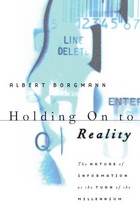
"[Borgmann] has offered a stunningly clear definition of information in Holding On to Reality. . . . He leaves room for little argument, unless one wants to pose the now vogue objection: I guess it depends on what you mean by nothing."—Paul Bennett, Wired
"A superb anecdotal analysis of information for a hype-addled age."—New Scientist
"This insightful and poetic reflection on the changing nature of information is a wonderful antidote to much of the current hype about the 'information revolution.' Borgmann reminds us that whatever the reality of our time, we need 'a balance of signs and things' in our lives."—Margaret Wertheim, LA Weekly

What is experimental knowledge, and how do we get it? While there is general agreement that experiment is a crucial source of scientific knowledge, how experiment generates that knowledge is far more contentious. In this book, philosopher of science James Mattingly explains how experiments function. Specifically, he discusses what it is about experimental practice that transforms observations of what may be very localized, particular, isolated systems into what may be global, general, integrated empirical knowledge. Mattingly argues that the purpose of experimentation is the same as the purpose of any other knowledge-generating enterprise—to change the state of information of the knower. This trivial-seeming point has a non-trivial consequence: to understand a knowledge-generating enterprise, we should follow the flow of information. Therefore, the account of experimental knowledge Mattingly provides is based on understanding how information flows in experiments: what facilitates that flow, what hinders it, and what characteristics allow it to flow from system to system, into the heads of researchers, and finally into our store of scientific knowledge.
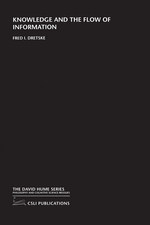
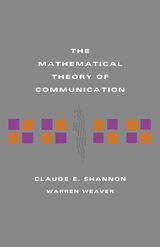
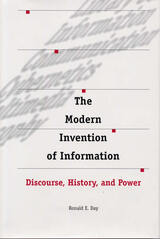
In The Modern Invention of Information: Discourse, History, and Power, Ronald E. Day provides a historically informed critical analysis of the concept and politics of information. Analyzing texts in Europe and the United States, his critical reading method goes beyond traditional historiographical readings of communication and information by engaging specific historical texts in terms of their attempts to construct and reshape history.
After laying the groundwork and justifying his method of close reading for this study, Day examines the texts of two pre–World War II documentalists, Paul Otlet and Suzanne Briet. Through the work of Otlet and Briet, Day shows how documentation and information were associated with concepts of cultural progress. Day also discusses the social expansion of the conduit metaphor in the works of Warren Weaver and Norbert Wiener. He then shows how the work of contemporary French multimedia theorist Pierre Lévy refracts the earlier philosophical writings of Gilles Deleuze and Félix Guattari through the prism of the capitalist understanding of the “virtual society.”
Turning back to the pre–World War II period, Day examines two critics of the information society: Martin Heidegger and Walter Benjamin. He explains Heidegger’s philosophical critique of the information culture’s model of language and truth as well as Benjamin’s aesthetic and historical critique of mass information and communication. Day concludes by contemplating the relation of critical theory and information, particularly in regard to the information culture’s transformation of history, historiography, and historicity into positive categories of assumed and represented knowledge.
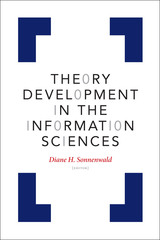
Emerging as a discipline in the first half of the twentieth century, the information sciences study how people, groups, organizations, and governments create, share, disseminate, manage, search, access, evaluate, and protect information, as well as how different technologies and policies can facilitate and constrain these activities. Given the broad span of the information sciences, it is perhaps not surprising that there is no consensus regarding its underlying theory—the purposes of it, the types of it, or how one goes about developing new theories to talk about new research questions.
Diane H. Sonnenwald and the contributors to this volume seek to shed light on these issues by sharing reflections on the theory-development process. These reflections are not meant to revolve around data collection and analysis; rather, they focus on the struggles, challenges, successes, and excitement of developing theories. The particular theories that the contributors explore in their essays range widely, from theories of literacy and reading to theories of design and digital search. Several chapters engage with theories of the behavior of individuals and groups; some deal with processes of evaluation; others reflect on questions of design; and the rest treat cultural and scientific heritage. The ultimate goal, Sonnenwald writes in her introduction, is to “encourage, inspire, and assist individuals striving to develop and/or teach theory development.”
READERS
Browse our collection.
PUBLISHERS
See BiblioVault's publisher services.
STUDENT SERVICES
Files for college accessibility offices.
UChicago Accessibility Resources
home | accessibility | search | about | contact us
BiblioVault ® 2001 - 2024
The University of Chicago Press









